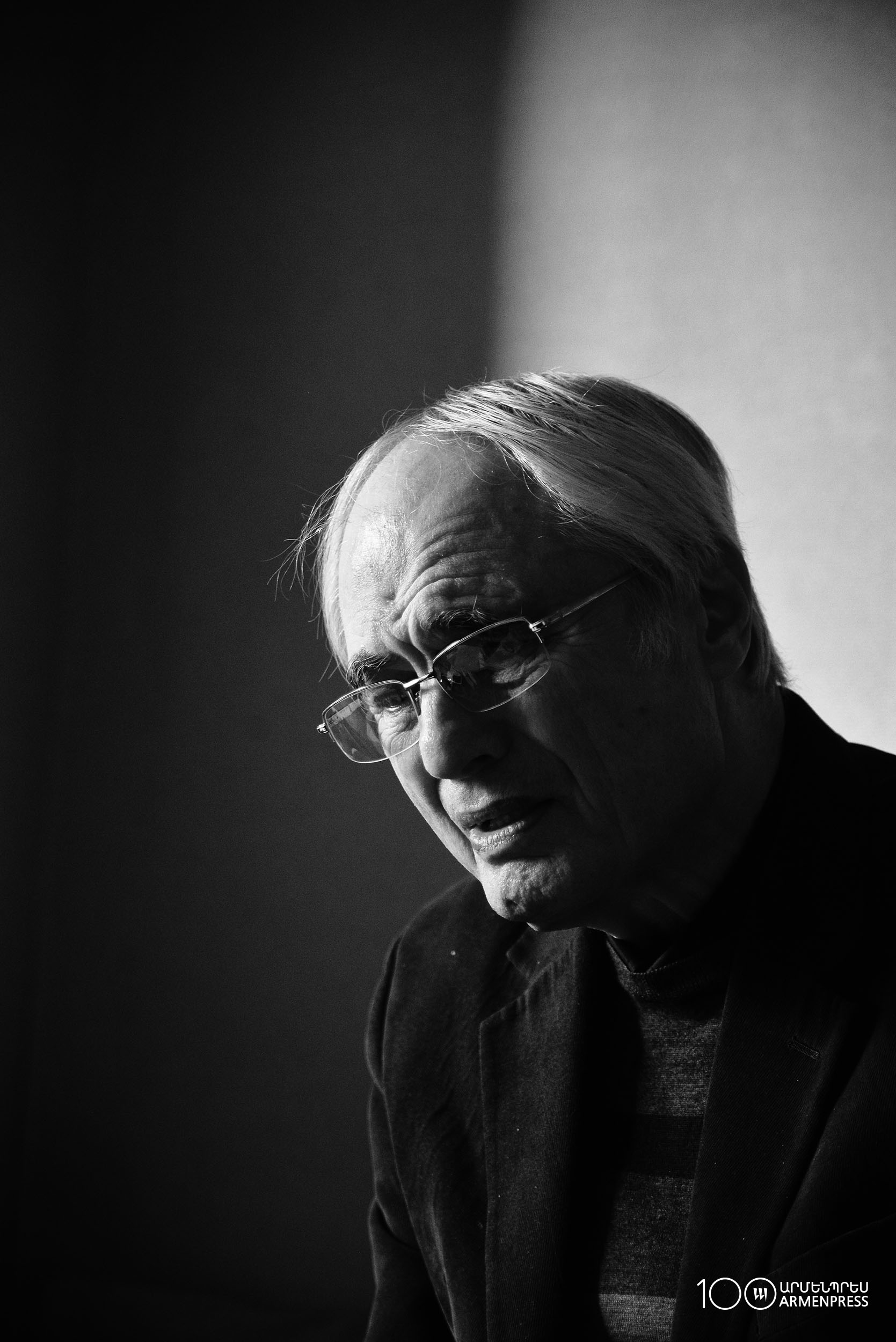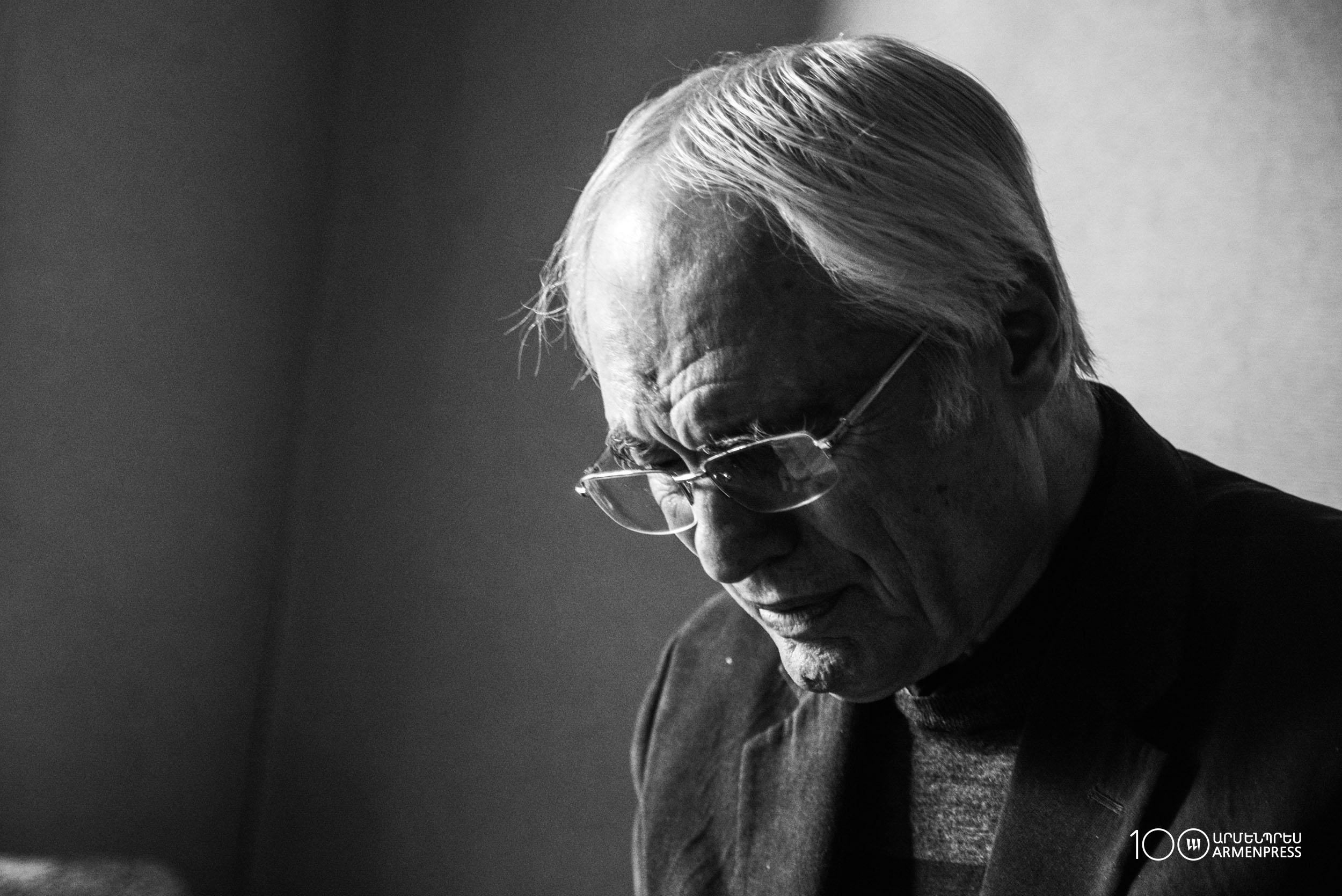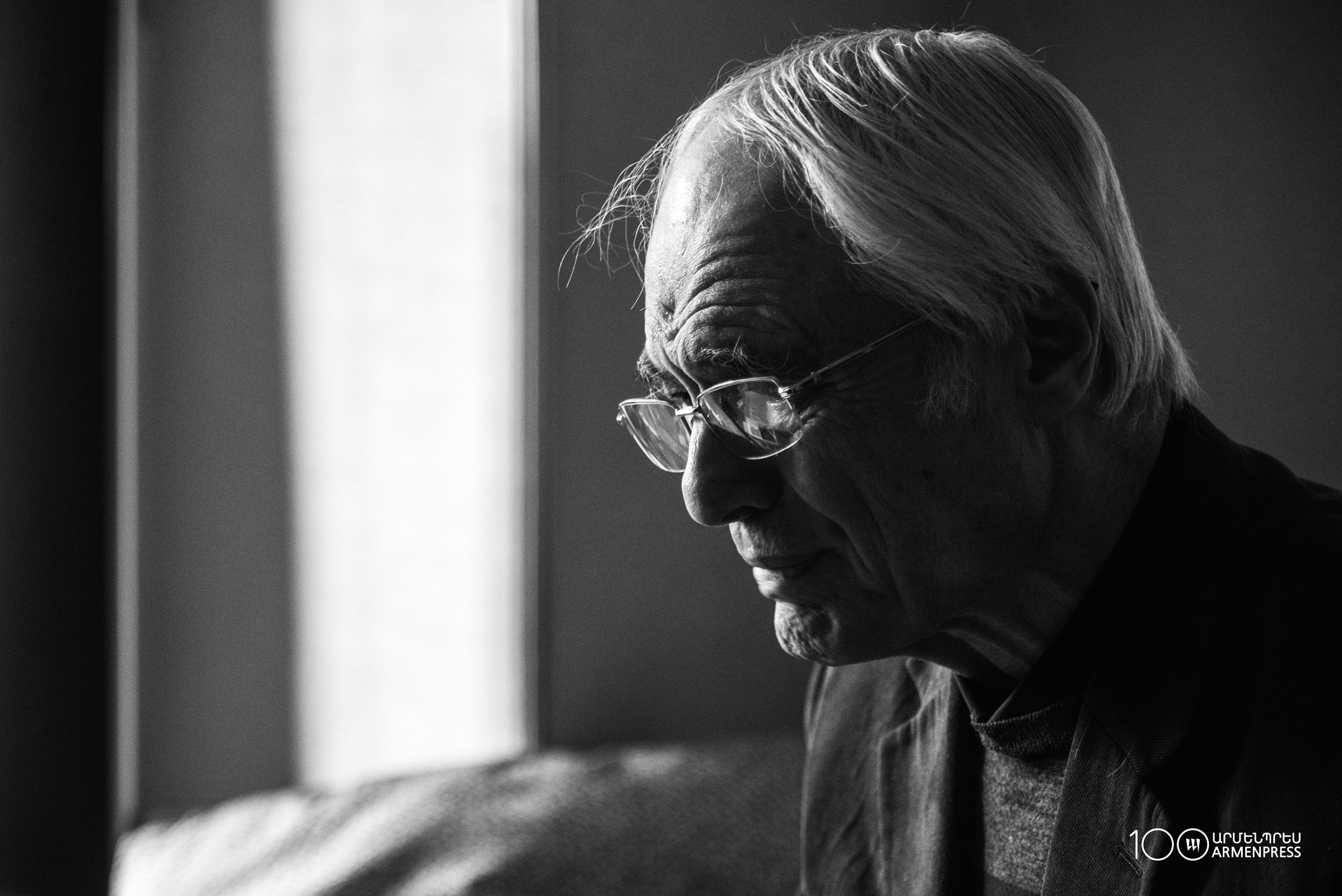‘Music is a mirror of life and textbook of anthropology’ - Maestro Tigran Mansurian in ARMENPRESS Exclusive
 09:18, 25 January 2019
09:18, 25 January 2019YEREVAN, JANUARY 23, ARMENPRESS. “Writing music is not a job for me. It’s not a way of self-expression either. It is me. I am alive…” this is how renowned composer Tigran Mansurian once described what music meant to him about 40 years ago. Now, a few days ahead of his 80th birthday, the maestro sat down with ARMENPRESS’s Hovhannes Ayvazyan to speak about his outstanding and remarkable life and career.
“It was late autumn in 1947 when our family arrived at the village of Pemzashen in Artik”, Mansurian says about his early years when he came back to Armenia from Beirut, Lebanon, his birthplace.
“Until then, I hadn’t seen any snow, no post-war famine, no remote village and no such unfamiliar environment. I approached the single-story building of the school. My head lowered. I entered. When my eyes got used to the darkness, I saw large portraits depicting other kind of people on the left and right of the corridor walls. I assume they were Mashtots and Abovyan, Pushkin and Tumanyan, and people like them…A few seconds later I looked at their faces, and I can’t consider what I felt to be a life program, but this moment was the beginning of striving for the world of this different kind of people. It wasn’t taking the path to glory, it was a way out for me from the cruel reality that I appeared in. This episode is forever with me, I very vividly remember this few seconds of my life, and they might awaken inside of me at any given moment”, says Mansurian.

“These few mystic seconds at the school corridor are my every days, when I wake up with Komitas, Charents, and other names so close to me that live in the other world. And each day begins with the condition of interacting with this family”.
Your first contact with music. You often repeat that you don’t have musical pre-education, and that you have learned solfeggio and music notation, elementary specialized literacy, all by yourself. Then, the Leninakan Music College, Yerevan’s R. Melikyan Music College, Komitas Conservatory….How was your love for music born or awakened?
"I was very little, I was on my way to a grocery store from our neighborhood in Beirut. I was passing the windows of a neighbor when the radio began playing music. I was passing through this song. A few steps after was the next window, and melodies of another song were flowing towards me from there. And, before reaching the store I would enter one song after another. My way back was also a path of songs. I can still remember a few of these songs, with melodies and lyrics. We had songs in our home also. My father was the always beloved singing voice at assembly and meeting places of Armenians in Beirut in those years. With six family members, we lived inside music, by singing at home and listening to other’s songs outside. We’ve had such kind of a lasting loyalty in our home for only one other thing – Armenian language,” the composer says.
Mansurian says to this day he can sing the lullaby that his mother used to sing to him. “And this melody makes me cry till now, when the “Sleep, baby, sleep” words in my mother’s voice reach my being through my inner hearing….This is very emotional…”

Over 40 years ago, ARMENPRESS’s Hovhannes Ayvazyan asked Mansurian to describe what music meant to him, and the composer answered: “Writing music is not a job for me. It’s not a way of self-expression either. It is me. I am alive…”
If I were to ask you the same question today, how would you respond?
“During these long years of living with music I have learnt so much from it. I have learnt to discover myself. I have learnt to discover myself layer by layer, to recognize human qualities that come into the art of sounds with possible precision, the stable, firm, fragile, decent and other similar things inside of it”.

Mansurian says that these qualities awaken from the interaction of a handful of sounds to reach a composition entirety. “If you will, music is a mirror of life and a textbook of anthropology, that was written by classics of the East and West, the servants of our church….”
Maestro, you have often reached out to Armenian and global literature. You have written vocal ranges based on poems by Shnorhali, Tumanyan, Isahakyan, Teryan, Charents, K. Zaryan, Lorca, Davoyan and others, and a ballet based on Andersen’s Snow Queen. You are the author of the Latin anthem of the World Assembly of Christians that took place in Australia, you have also authored the internationally acclaimed Requiem again in Latin….As we can see, you still keep your connection with literature firmly not only as a booklover.

"I began writing poems from second grade. Pardon me for saying, but this bad habit lasted until 1969, when I was already 30 years old. During those years I was passing the path of writing music at the price of great overcoming. And one day I said to myself: “Your poetry writing is a result of a spark of a second, you quickly write and say – that’s it.” That day, I said to myself: “The resistance of overcoming that you go through while writing music, men of your age go through while writing poetry. You put an end to this “bad habit” of writing so easily, let this work be done by those who can create many many versions of the same poem, like you do while writing music. Therefore, let them write this poetry, and you do your job”. This is how I tore all my poems and freed myself from them and never returned to this filthy writing mania. The book is always in my hand. Indeed, I have always been a booklover all my life. I used to turn nights into days by reading literature books, and then I was going to school like a drunk. Not only was I enjoying my love for reading, but I also loved living in the book’s reality”.
“I love the Armenian language as much as I sometimes say: “I am the musician of the Armenian language”
Mansurian says he got connected with Charents most, among other poets. He says the vocal and choral songs written by him based on Charents’s poetry can become an entire concert program.

Six poems by Tumanyan were made into a choral range by Mansurian. “I’ve had years of living with Teryan, I sang six poems by him. I reached Isahakyan very late”.
“I was carried away with Sevak, for many times I tried to sing his poem….it didn’t and didn’t happen. I wanted my singing, but his poem didn’t. And one day I thought to myself: “Perhaps this inability of mine is because of this poem is extremely masculine, untamable to music”.
Mansurian says he was close friends with the late poet Hamo Sahyan. And they were also neighbors, living in the same neighborhood in downtown Yerevan. “I have a view from my 5th storey balcony to his 5th storey balcony – I am here, but he isn’t, for already many years”.

On January 27, two-time Grammy nominee Tigran Mansurian will celebrate his 80th anniversary of birth. And he has two expectations from the jubilee event. “I have told the organizers of the birthday: My expectation is two evenings of concerts. One with solo and choir based on Avetik Isahakyan’s poems, and the other based on Yeghishe Charent’s poems. The remaining is up to you”.
One of the renowned Russian composers, your friend Andrei Volkonsky once said: “Mansurian is more French than he is German”. Asked to elaborate on what the Russian musician meant, Mansurian highlighted the similarities between Armenian and French in terms of the sound styles. He also highlights the phonology of the two languages, namely that the two have the same stable stressing system. “I strongly believe that this stressing system of the language has great impact on musical thinking”, he says.

“During the development and establishment of a musician, among others, the language in which he has spoken and was brought up has a great role”.
Mansurian says his favorite European opera is Pelléas et Mélisande by Claude Debussy. “When Richard Strauss decided to write his new opera in French, he asks Romain Rolland for advise, as to which French composer one should follow for bringing French into the music arena. Romain Rolland advises him to orientate for the opera by Debussy that I mentioned”.

The full interview is available in Armenian language.
Mansurian, Tigran (b. January 27, 1939, Beirut). Lebanese-born Armenian composer of mostly orchestral, chamber, choral, and vocal works that have been performed throughout the world.
Composer Mansurian studied composition with Edvard Bagdasarian at the Romanos Melikian College of Music in Yerevan from 1956-60, and with Lazarus Sarian at the Yerevan Komitas State Conservatory from 1960-65, with whom he continued his post-graduate studies from 1965-67.
His creative efforts were well received from the very beginning of his career, evidenced by the fact that he won two First prizes in the All-Union Competition in Moscow (c. 1966, for Partita; c. 1968, for Four Hayrens).
He taught modern music theory at the Yerevan Komitas State Conservatory from 1967-86, and served rector of the Conservatory from 1992 to 1995.
Mansurian is recognized as one of the forerunners of contemporary music in the former USSR, being the first to introduce modern composition techniques in Armenia.
His compositions have been performed to great acclaim in London, Paris, Rome, Milan, Berlin, Munich, Vienna, Moscow, Warsaw, Zagreb, New York, Los Angeles, and other musical capitals of the world. Pierre Boulez spoke highly of his composition “Intérieur” when it was performed at IRCAM in Paris in 1984.
Mansurian’s compositions are an interesting mixture of Armenian art music and folk traditions, with bright, expressive melodies and exquisite, impressionistic tone color. His works may be grouped into five categories:
Instrumental chamber music (concertos, sonatas, etc., for piano, strings, and horns),
Vocal music (both choral and solo), with and without instrumental accompaniment,
Symphonic music (for both full-scale orchestras and chamber orchestras),
Program music (for motion pictures and stage plays), and
Ballet.
He has lived in Armenia since 1947.
Edited and translated by Stepan Kocharyan





















